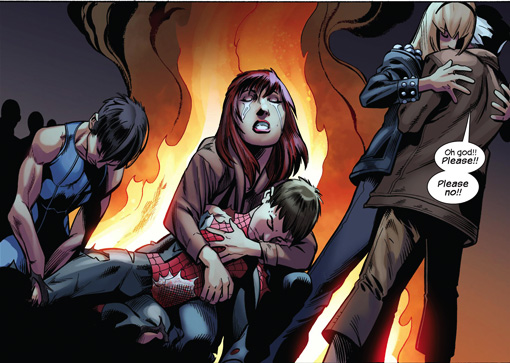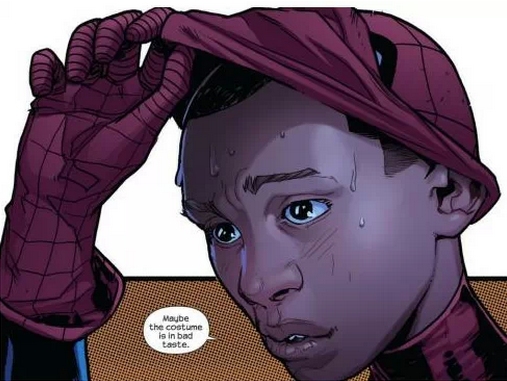
 Hey there, Crawl Spacers! I hope the Minimum Carnage reviews have been enough to tide you over since the last Cushing Critique, but today I’m back and I’m here to talk to you about Miles Morales. Young Miles is the new character occupying the identity of Spider-Man over in the Ultimate Comics line, and at only 15 issues and a little over a year into his series, he’s still a very new face for readers to get used to. He was the subject of much controversy when his identity was announced after last year’s “Death of Spider-Man,” and while most of the controversy has died down, there are still those out there who haven’t been won over yet. So click below to read the rest of this article, and I’ll make my case for why Ultimate Comics Spider-Man is a title you should be reading.
Hey there, Crawl Spacers! I hope the Minimum Carnage reviews have been enough to tide you over since the last Cushing Critique, but today I’m back and I’m here to talk to you about Miles Morales. Young Miles is the new character occupying the identity of Spider-Man over in the Ultimate Comics line, and at only 15 issues and a little over a year into his series, he’s still a very new face for readers to get used to. He was the subject of much controversy when his identity was announced after last year’s “Death of Spider-Man,” and while most of the controversy has died down, there are still those out there who haven’t been won over yet. So click below to read the rest of this article, and I’ll make my case for why Ultimate Comics Spider-Man is a title you should be reading.
SPIDER-MAN IS DEAD! LONG LIVE SPIDER-MAN!
 Let’s start with a little history for the uninitiated. In 2011, longtime Ultimate Spider-Man writer (in fact, the only one, ever) Brian Michael Bendis did the unthinkable and wrote a story called “The Death of Spider-Man” that actually delivered on its title. In the end, a bullet and a beating from the Green Goblin claimed the life of Peter Parker. It was considered by many, though, to be a great ending, letting Peter die happy because he was able to save Aunt May.
Let’s start with a little history for the uninitiated. In 2011, longtime Ultimate Spider-Man writer (in fact, the only one, ever) Brian Michael Bendis did the unthinkable and wrote a story called “The Death of Spider-Man” that actually delivered on its title. In the end, a bullet and a beating from the Green Goblin claimed the life of Peter Parker. It was considered by many, though, to be a great ending, letting Peter die happy because he was able to save Aunt May.
When a new volume of the comic was launched, it skipped back in time a bit and focused on a brand new character, the 13-year-old Miles Morales. Miles’ uncle Aaron also got some of the spotlight as the Ultimate Comics version of cult-favorite Spidey character The Prowler. As The Prowler, he broke into Oscorp, the place where Ultimate Spider-Man was born when Peter was bitten by a genetically engineered spider. Norman Osborn had never stopped trying to replicate that result, and a latter-day genetically altered spider made its way into Prowler’s bag before he escaped. When Miles paid a visit to his uncle, he was bitten by the spider and an all new Spider-Man was born.
Well, not yet. Miles manifested powers (including some new ones like invisibility) but he didn’t immediately become a superhero. It was not very long, though, before this story synced up with the timeline of the previous volume and Peter Parker’s death became worldwide news. There was a bit of a rocky road with Miles starting out wearing a Halloween shop version of Peter’s costume which everyone agreed was in bad taste, but over time Miles got his own costume and became his own Spider-Man, even getting approval from Nick Fury and eventually Captain America.
So now we know how Miles became the new Ultimate Spider-Man, but the question remains – who is Miles Morales? The first thing he is, and maybe the best thing, is he’s NOT Peter Parker. One of the chief pre-criticisms of this new character before he actually debuted (it’s the internet age, it’s going to happen) was that Brian Bendis, being the same guy who’d just written 160 issues of Ultimate Peter Parker, would just write Miles the exact same way and all we’d get is the same guy with a new face. Well, I’m here to tell you, that didn’t happen.
Miles, more than Peter Parker ever was, is just a regular kid. He’s not a super-genius that can invent webshooters for himself. He’s not an orphan. He’s not dealing with the recent death of his uncle (or he wasn’t – more on that later). He’s a kid with two parents who are still married (kind of a shock for a teenage superhero) who had to work hard (and win a lottery) to get into a good school and simply found something more in himself when he felt the call. Peter Parker has always been intended to be an “everyman,” a character the regular reader can relate to. And when written correctly, he is very relatable. But with his genius-level intellect allowing him to invent any number of gadgets for himself and these days getting him a super-science job that he describes ad-nauseum as his “dream job” kind of puts him out of reach of most readers as someone to aspire to. We can aspire to his moral code and his courage all we want, but we can’t totally aspire to be him. A genius-level intellect isn’t something you can aspire to. You have it or you don’t, and most of us just don’t. (As a side note: This is why the idea that Spider-Man became unrelatable because he was married to a supermodel never held water for me. If being one of the smartest people in the world is relatable, then marrying someone you’ve known your entire adult life isn’t going to kill that.) So Miles, to my mind, comes out ahead of Peter in the relatability department, and because of that I think he’s a character that it’s easier for kids to aspire to, because they can genuinely see themselves BEING him.
One of the great things about the way Peter died, heroically and with his identity revealed to the world, is that his influence continues to reverberate throughout the entire Ultimate Universe, even more so than ever before. After Miles found out about Peter’s death, already knowing about his own spider-powers, he felt compelled to go to the funeral where he saw Gwen, who he recognized as having been close to Peter when he died. He asked Gwen why Peter did it, and she passed on the mantra to him – “With great power comes great responsibility.” Even though Spider-Man is now someone completely unconnected to the Parker family, he is still someone driven by those words. And more than that, he’s driven by the sacrifice of Peter Parker and honoring his memory. In this way, Peter himself has become the Uncle Ben figure of the new Ultimate Spider-Man and it’s really a great role for him to play. Even after death, he is one of the most important characters in the story.
More than just Peter himself, Peter’s supporting cast hasn’t been ignored just because he’s dead either. In a recent issue Miles met Aunt May for the first time (along with Gwen who he’d already met at the funeral and MJ – Captain America was there, too). Peter’s family actually argued against Captain America in support of Miles’ right to be Spider-Man, and in the end Aunt May passed Peter’s webshooters along to Miles. Miles then used those webshooters to go out and beat the Rhino, an old villain of Peter’s.
UNCLE AARON IS NO UNCLE BEN
 One of the more interesting parts of the way Brian Bendis has structured Miles’ story is to take the archetypal figure of “Spider-Man’s uncle” and turn it totally on its head. Peter Parker’s Uncle Ben is inarguably responsible for Peter becoming Spider-Man. Peter was acting selfish and on a path to become a professional wrestler at best, and a supervillain at worst. Ben Parker’s death which Peter felt responsible for, coupled with the example he set, put Peter on the right path and made Ben directly responsible for the birth of the superhero we know as Spider-Man. Miles Morales wasn’t so lucky in the uncle department.
One of the more interesting parts of the way Brian Bendis has structured Miles’ story is to take the archetypal figure of “Spider-Man’s uncle” and turn it totally on its head. Peter Parker’s Uncle Ben is inarguably responsible for Peter becoming Spider-Man. Peter was acting selfish and on a path to become a professional wrestler at best, and a supervillain at worst. Ben Parker’s death which Peter felt responsible for, coupled with the example he set, put Peter on the right path and made Ben directly responsible for the birth of the superhero we know as Spider-Man. Miles Morales wasn’t so lucky in the uncle department.
Uncle Aaron was also responsible for Miles becoming Spider-Man, but in the sense that he is actually responsible for Miles getting bitten by the spider that gave him his powers. His uncle, however, went on to manipulate and blackmail Miles, making him his enforcer in a bid to take over New York’s underworld as its new Kingpin and putting him in a battle he wasn’t really ready for against the new Ultimate Scorpion (not to be confused with the clone of Peter Parker that became Ultimate Scorpion during the Clone Saga).
The really interesting part came when Miles finally decided to stand up to his uncle and the big Spider-Man vs. Prowler fight ended with the death of Uncle Aaron. Miles had used one of his venom blasts on Aaron, and Aaron’s suit subsequently exploded, killing him. Uncle Aaron died saying “you’re just like me.” This event left Miles with severe guilt over the death of his uncle, but in a much worse way than Peter Parker had had to deal with, since Miles thought he had actually delivered the killing blow.
Refreshingly, Brian Bendis elected not to leave this hanging around young Miles’ neck for too long, though. Just a few issues later, Miles is told by Detective Maria Hill (easter egg, yo!) that Aaron’s death was not Spider-Man’s fault, but the fault of shoddy equipment stolen from the Tinkerer. By making this move, Bendis was able to have Miles learn the lesson that he needs to be careful with his venom blasts (or “stings”) without having this guilt hang over him for the rest of his life. It would have been easy to do, too. It would be a major thing to bring the Miles Morales character closer to the Peter Parker character, but by boldly resolving that guilt quickly, Bendis has signaled that he is not going down that path, but truly telling a new story with a new character. After all, if you want stories about Peter Parker, there are plenty of places to get those. Wouldn’t we rather instead read the story of Miles Morales? I know I would.
“HE’S BARACK OBAMA AS SPIDER-MAN”
This is something I was hearing a lot around the time Miles was announced and then introduced, and while you don’t hear it much anymore, there are still those that like to sling around the meme that Marvel just wanted to make Barack Obama Spider-Man, and that even assert that Miles looks like Barack Obama.
Bullshit.
You know what Miles Morales and Barack Obama have in common? They’re both half African American. That’s it, we’re done, that’s the entirety of the similarities between the two. They don’t even have the other half of their race in common, as President Obama is half Caucasian while Miles Morales is half Latino.
Beyond only half of their racial heritage, I invite anyone to tell me what else the two have in common. Miles is a 13-year-old kid who we’ve never heard any political statements out of. How he could be construed as Barack-Obama-as-Spider-Man is beyond me.
This statement, though, is just an extension of the segment of fandom that accused Marvel of creating Miles simply as a PC diversity headline grab. Let me redirect that idea into this question, though: What reason would Marvel have for creating a new white Spider-Man? Comic books specifically and fiction in general are all chock-full of straight, white, male heroes. We’ve got plenty. More than we’ll ever need, really. So considering Brian Bendis had this great story of The Death of Spider-Man and there was an opportunity to create a new Spider-Man, the question isn’t, “What’s the ulterior motive for making the new guy half African American and half Latino?” The question is, “What possible reason would Marvel have had to create a new straight, white, male Spider-Man?”
In fact, after Miles’ race became a news story, a rumor started circulating that he would also be gay. That same segment of fandom asserted that this was proof positive that it was a PC publicity stunt. My question was, “Why not?” Had Miles Morales been a gay character (which he turned out not to be), all that would have meant was young gay readers would have had about THREE heroes like them to look up to now instead of the previous roughly-two. I recognize that there are people out there, some of them comic book readers, who think homosexuality is immoral. I disagree with them entirely, but that’s not the point. The point is, those readers don’t want to read about homosexual superheroes, and that’s their right. As I stated that still leaves them with ALMOST EVERY BOOK ON THE STANDS. No one can realistically expect every book on the stands to line up perfectly with their own morality. My personal morality says that gay kids have it rough in more ways than most of us straight guys can imagine, and the more they can look up to a superhero that is like them who might be able to give them some hope and comfort and something to aspire to and hope for, the better this world might get and the more bearable their childhoods might become.
But in the end, the true test of whether or not the character of Miles Morales would be known as a PC publicity stunt was always going to be the comics themselves. And the proof really is in this pudding folks. Since the beginning, Brian Bendis and excellent artists like Sara Pichelli and David Marquez have been crafting a comic that this Spider-Man fan finds entirely worthy of the name. And you don’t have to take it from me. By and large, the reviews of this volume of Ultimate Comics Spider-Man have been overwhelmingly positive. Miles has made his mark and he’s a hit. The only real detractors I hear from these days tend to be people that haven’t actually read the book, so I would implore them to do so and see for themselves. Because personally, I really feel like Bendis has given us a new character that can very much stand the test of time and a story that has been a great, compelling ride since the beginning.
MEETING PETER PARKER
In the recently-wrapped Spider-Men mini-series, an unprecedented event occurred when the regular Marvel Universe’s Peter Parker, The Amazing Spider-Man, was transported to the Ultimate Universe by the machinations of Mysterio and came face to face with Ultimate Spider-Man Miles Morales. The event provided some good moments for all the characters involved, and though in the end I felt it fell short of doing anything truly earth-shattering, it did mark two important moments for Miles. First, he was able to get the blessing of Peter Parker. For a kid trying to live up the memory of a dead hero, it is pretty huge to be able to work with and subsequently earn the approval of that dead hero, or at least a version of him. Second, it established that there is a Miles Morales in the original Marvel Universe, though we were left with no information about him. The frustrating thing is, this mini-series was written by Brian Bendis, writer of Ultimate Spider-Man, so there’s no telling when or where the writers of Marvel Universe Spider-Man, who had nothing to do with the story, might follow up on that. Considering the events Amazing Spider-Man is mired in for the next few months (re: it’s ending), I’m not going to hold my breath right now.
IN CONCLUSION
The conclusion should be fairly obvious unless you skipped to the end of the article – this is a book worth reading. This is a character worthy of being Spider-Man. This is a story I’m on board for as long as Brian Bendis wants to tell it. If you haven’t tried Ultimate Spider-Man, I just can’t recommend it highly enough.










Very well written article, I enjoyed it thoroughly. Miles (imo) is a great successor to the Spider-Man legacy, and USM is my go to book when I want a Spider-Man fix (actually to tell the truth, USM has been my go to Spider-Man book for years now.)
Bendis, for all the stuff I’ll give him on team books, he just hits the right notes with me on USM throughout so he’s my go to Spidey writer now.
BTW (Nerd alert). Miles and Obama don’t even share the ‘half African-American” label since Obama is half 100% African while Miles is half African-American (A big difference actually). 😀
Kev, I wholeheartedly agree with your analysis that USM with Miles Morales is not only a good read, but a fresh take on a new character instead of Peter Parker with a new name. I also feel that Peter’s essence is still very much part of the book, and that is one reason I am enjoying it. The other reason is I feel that this is truly uncharted territory, not some half baked reboot. Bendis took a risk on going this route, and I hope he stays the course on it. So far so good…
Very well done..!
Fantastic article 🙂 Already looking forward to the next. Could you give us a teaser on what it is?
Good article, Kev. I really have to get this book. Since Blue Beetle’s getting cancelled, I’m free to pick up another title.